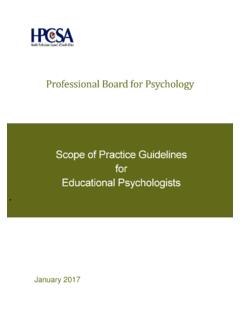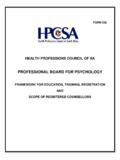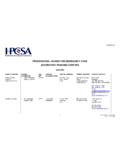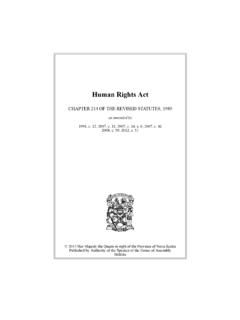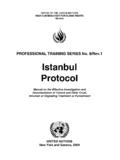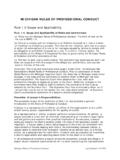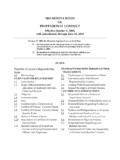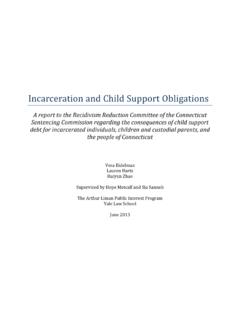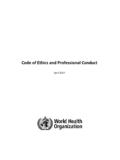Transcription of HEALTH PROFESSIONS COUNCIL OF SOUTH AFRICA
1 HEALTH PROFESSIONS COUNCIL OF SOUTH AFRICA GUIDELINES FOR GOOD PRACTICE IN THE HEALTHCARE PROFESSIONS GENERAL ETHICAL GUIDELINES FOR THE HEALTHCARE PROFESSIONS BOOKLET 1 PRETORIA SEPTEMBER 2016 HEALTH PROFESSIONS COUNCIL of SOUTH AFRICA Post Office Box 205 Pretoria 0001 Telephone: (012) 338 9300 Fax: (012) 328 4863 E-mail: Website: i THE SPIRIT OF PROFESSIONAL GUIDELINES Practising as a healthcare professional is based upon a relationship of mutual trust between patients and healthcare practitioners.
2 The term profession means a dedication, promise or commitment publicly made .1 To be a good healthcare practitioner, requires a life-long commitment to sound professional and ethical practices and an overriding dedication to the interests of one s fellow human beings and society. In essence, the practise of healthcare PROFESSIONS is a moral enterprise. In this spirit, the HPCSA presents the following ethical guidelines to guide and direct the practice of healthcare practitioners.
3 These guidelines form an integral part of the standards of professional conduct against which a complaint of professional misconduct will be evaluated. [Note: The term healthcare practitioner in these guidelines refers to persons registered with the HPCSA]. 1 Pellegrino, ED. Medical professionalism: Can it, should it survive? J Am Board Fam Pract 2000; 13(2):147-149 (quotation on p. 148). ii TABLE OF CONTENTS Acknowledgements .. iii 1. Introduction.
4 1 2. Core ethical values and standards for good practice .. 2 3. How to resolve ethical dilemmas .. 3 4. What it means to have a duty .. 4 5. Duties to patients .. 5 6. Duties to colleagues and other healthcare practitioners .. 10 7. Duties to patients of other healthcare practitioners .. 10 8. Duties to themselves .. 11 9. Duties to society .. 11 10. Duties to the healthcare profession .. 12 11. Duties to the environment .. 12 iii ACKNOWLEDGEMENTS The HEALTH PROFESSIONS COUNCIL of SOUTH AFRICA wishes to thank the following persons for their contributions towards the revision of the guidelines: The Committee for Human Rights, Ethics and Professional Practice of the HEALTH PROFESSIONS COUNCIL of SOUTH AFRICA for initiating and advising the review process.
5 Ms RM Kekana (Chairperson), Prof A. Dhai, Prof D J. McQuoid-Mason, Ms V Amrit, Rev G Moerane, Dr C Vincent-Lambert, Mr R Mjethu and Dr TKS Letlape, Prof A. Dhai, Prof McQuoid-Mason, Dr N Msomi and LIFElab for the development of the ethical guidelines for Biotechnology Research in SOUTH AFRICA . Prof D. J McQuoid-Mason for his editorial advice on the booklets Adv Mathibeli as the legal advisor, Ms N Manciya as Committee coordinator and Mr N Sipeka, as the COUNCIL secretariat. GENERAL ETHICAL GUIDELINES FOR THE HEALTHCARE PROFESSIONALS 1.
6 INTRODUCTION Being registered as a healthcare professional with the HEALTH PROFESSIONS COUNCIL of SOUTH AFRICA (HPCSA) confers on us the right and privilege to practise our PROFESSIONS . Correspondingly, practitioners have moral or ethical duties to others and society. These duties are generally in keeping with the principles of the SOUTH African Constitution (Act No. 108 of 1996) and the obligations imposed on healthcare practitioners by law. This first booklet on general ethical guidelines contains value-oriented principles and express the most honourable ideals to which members of the healthcare profession should subscribe in terms of their conduct More specific, the ethical guidelines and rules are derived from these general ethical guidelines.
7 They offer more precise guidance and direction for action in concrete situations. They also make it possible for the HPCSA to implement sanctions against transgressors. It is impossible, however, to develop a complete set of specific ethical prescriptions applicable to all conceivable real-life situations. In concrete cases, healthcare professionals may have to work out for themselves what course of action can best be defended ethically. This requires ethical reasoning. This booklet lists thirteen core ethical values and standards that underline professional and ethical practice in healthcare PROFESSIONS , and gives a short explanation of how one makes practical decisions through ethical reasoning.
8 It then explains what a duty is, and catalogues the general ethical duties of healthcare professionals [Note: In this booklet, the expressions professional or practitioner are used interchangeably to refer to healthcare practitioners]. [Note: Environmental HEALTH Practitioners do not see patients] 2 2. CORE ETHICAL VALUES AND STANDARDS FOR GOOD PRACTICE Everything ethically required of a professional to maintain good professional practice is grounded in the core ethical values and standards the latter are the directives that follow the core values.
9 These core values and standards are presented as a linear list for the sake of simplicity. In concrete cases, the demands of these core values and standards may clash, thus making competing demands on healthcare practitioners. The only way to address such clashes is through ethical reasoning. The core ethical values and standards required of healthcare practitioners include the following: Respect for persons: Healthcare practitioners should respect patients as persons, and acknowledge their intrinsic worth, dignity, and sense of value.
10 Best interests or well-being: Non-maleficence: Healthcare practitioners should not harm or act against the best interests of patients, even when the interests of the latter conflict with their own self-interest. Best interest or well-being: Beneficence: Healthcare practitioners should act in the best interests of patients even when the interests of the latter conflict with their own personal self-interest. Human rights: Healthcare practitioners should recognise the human rights of all individuals.


